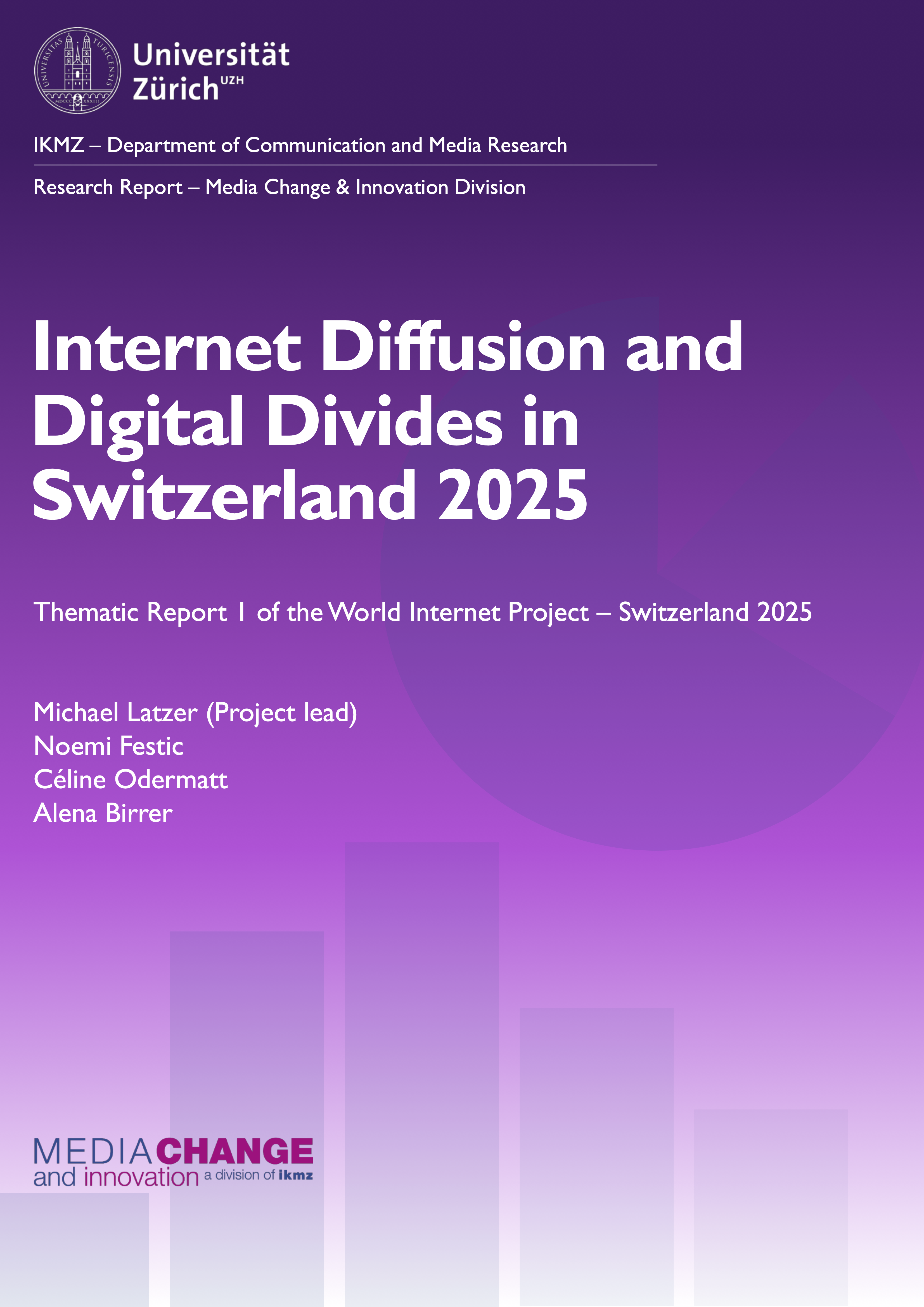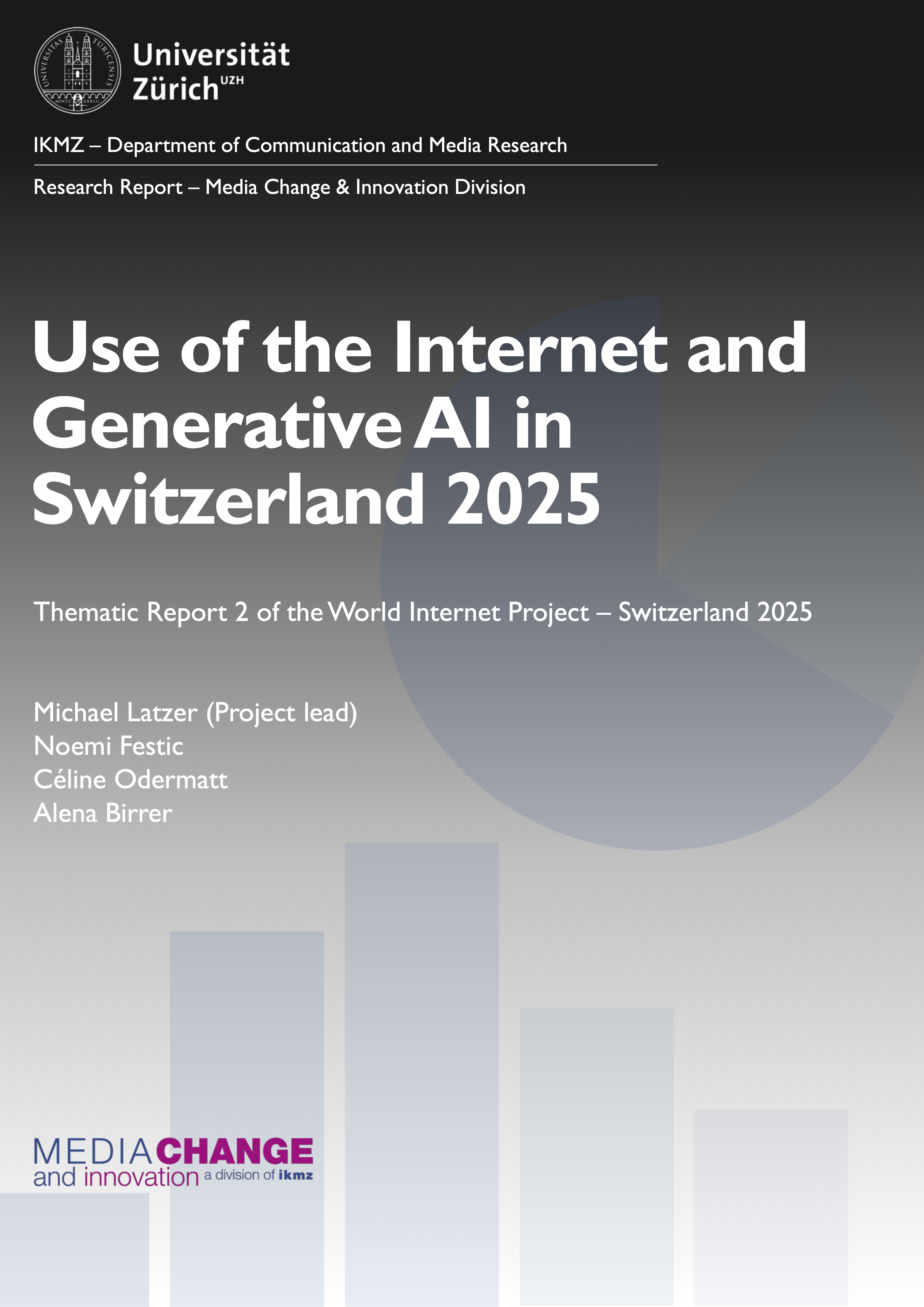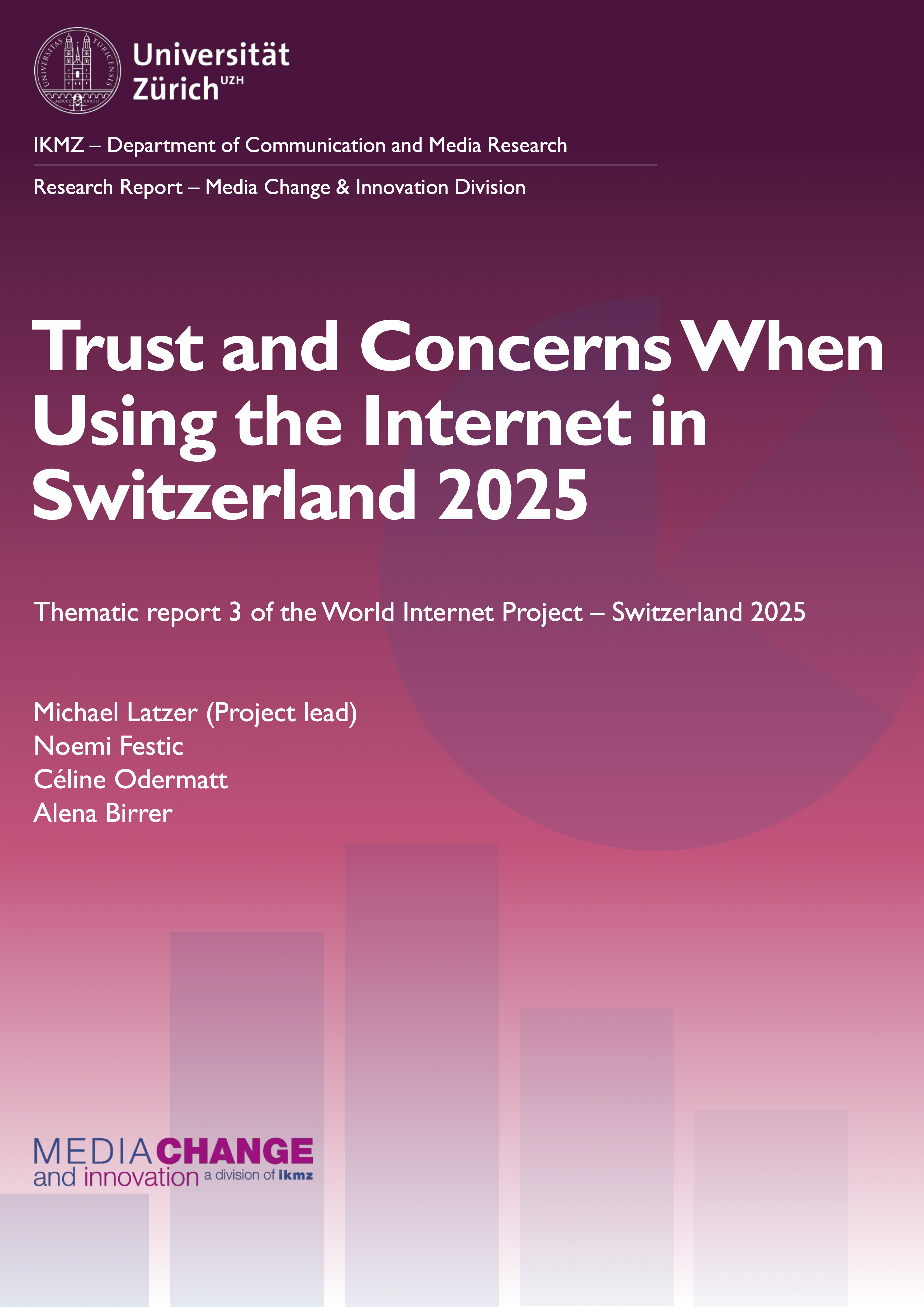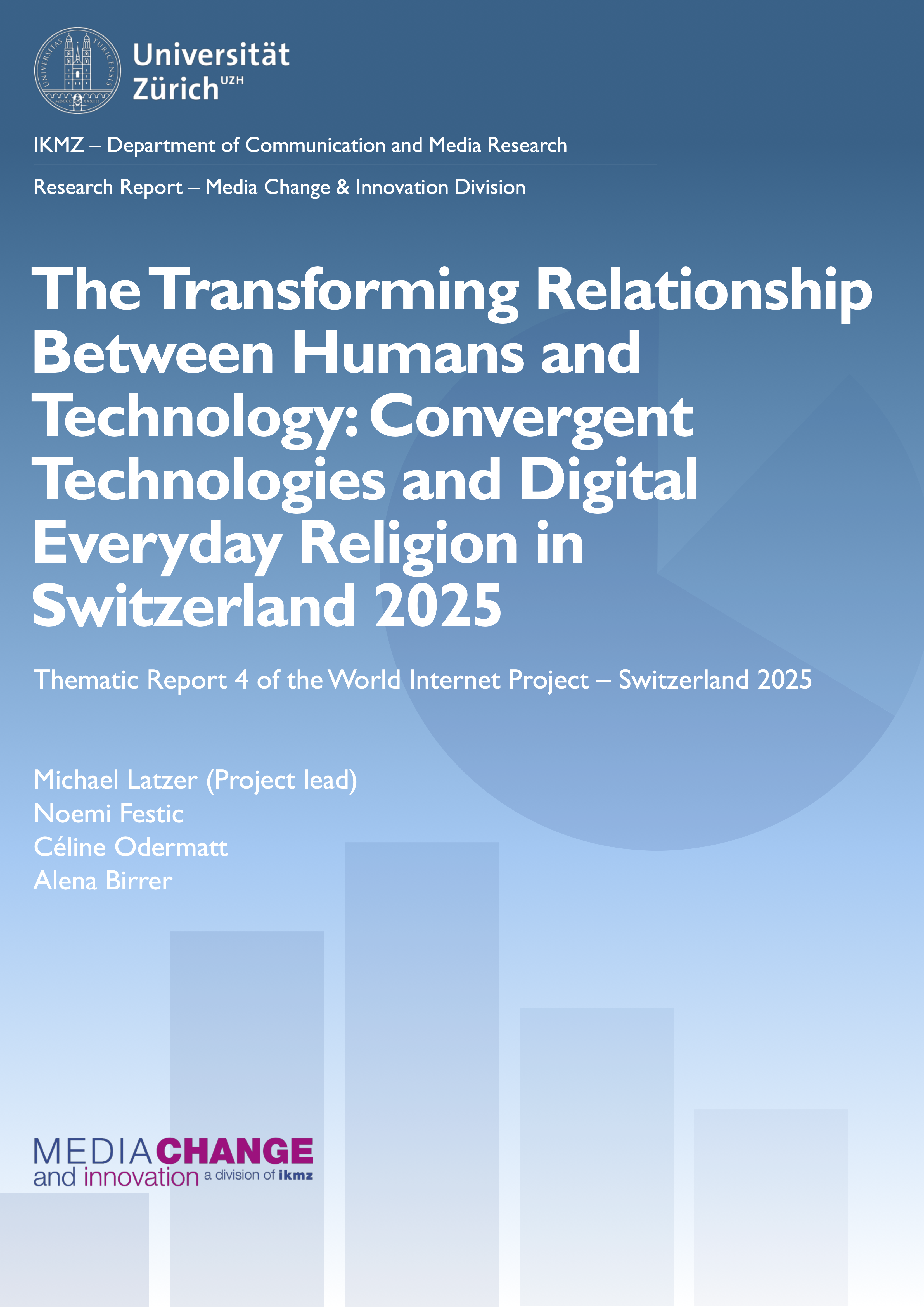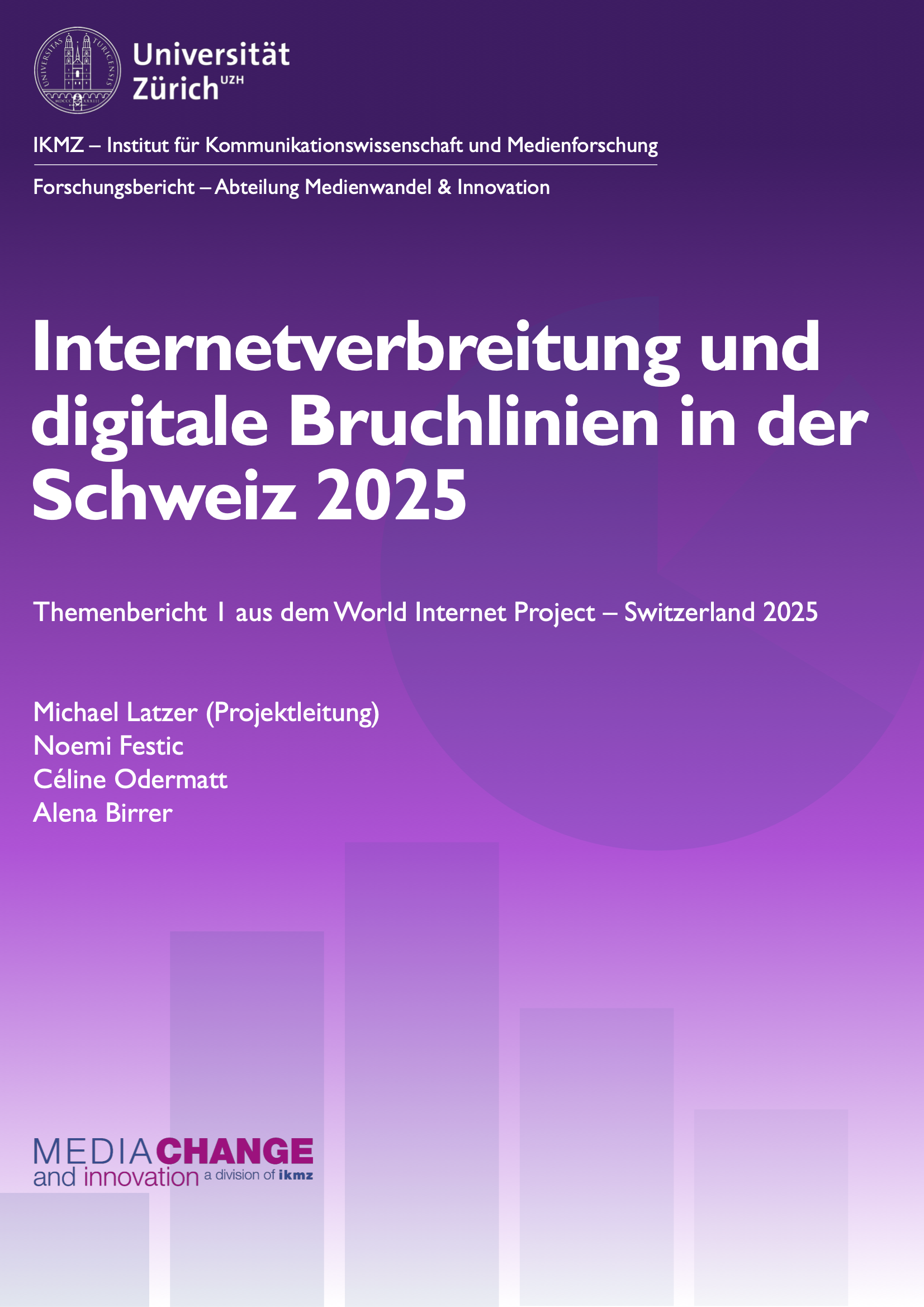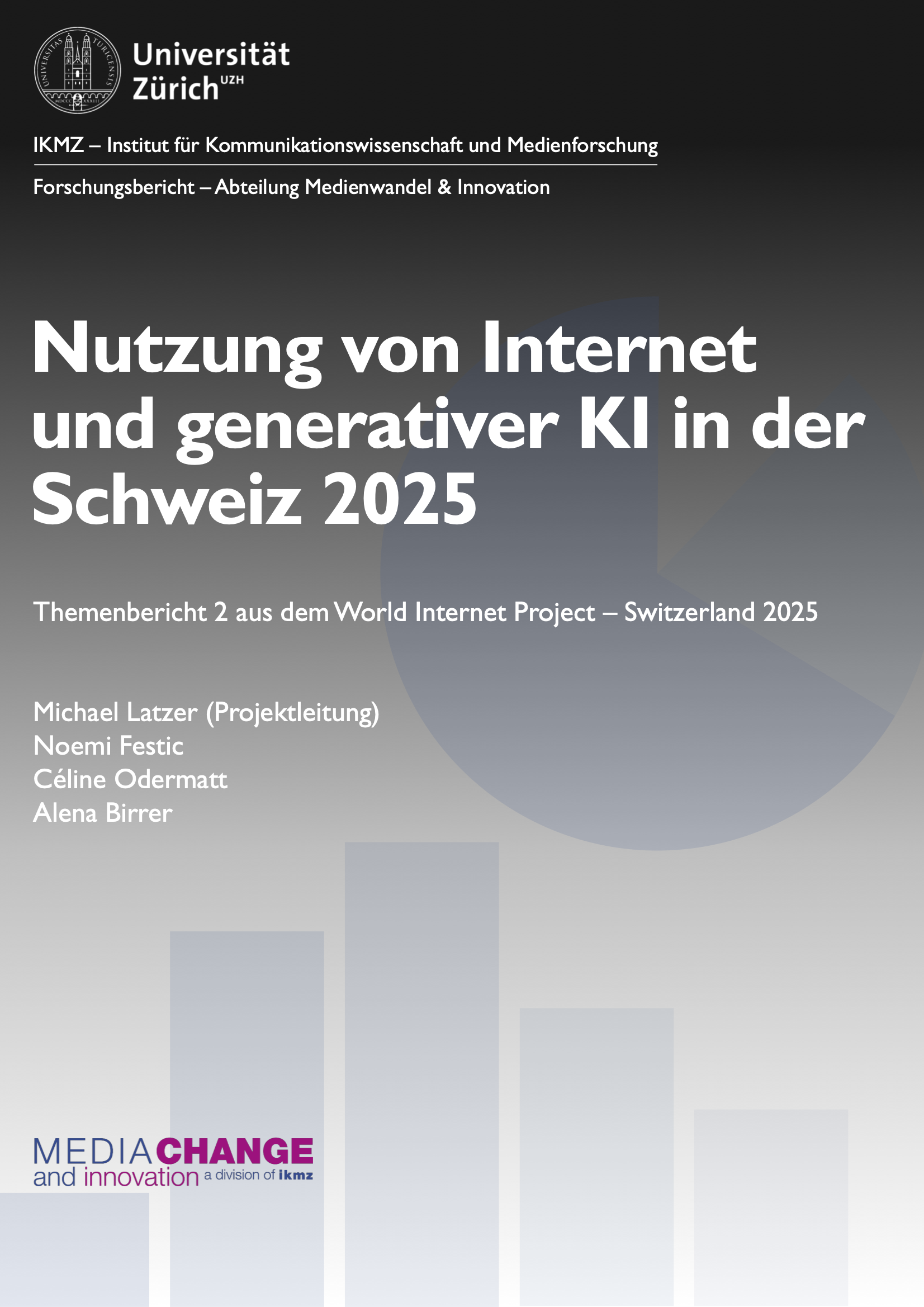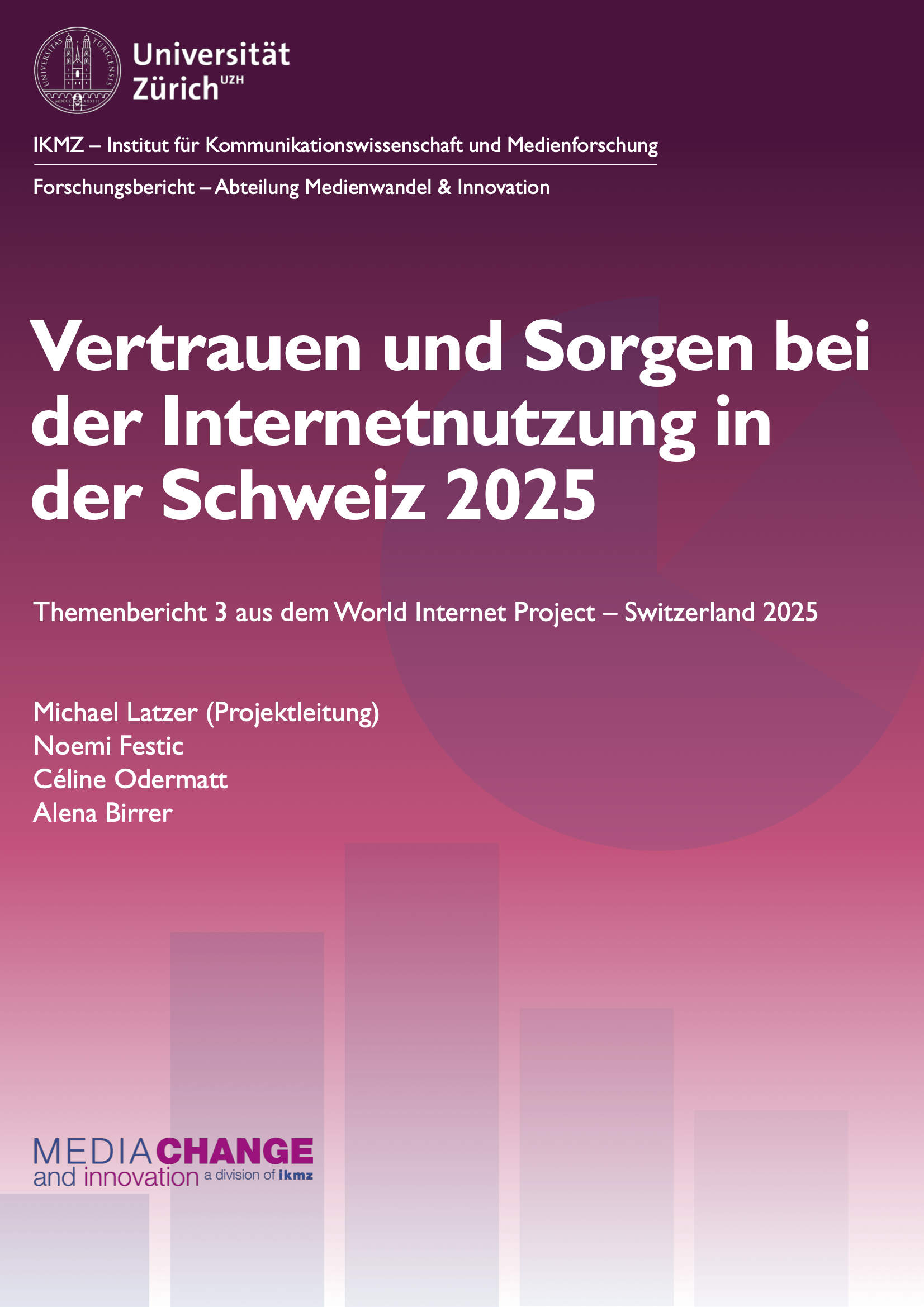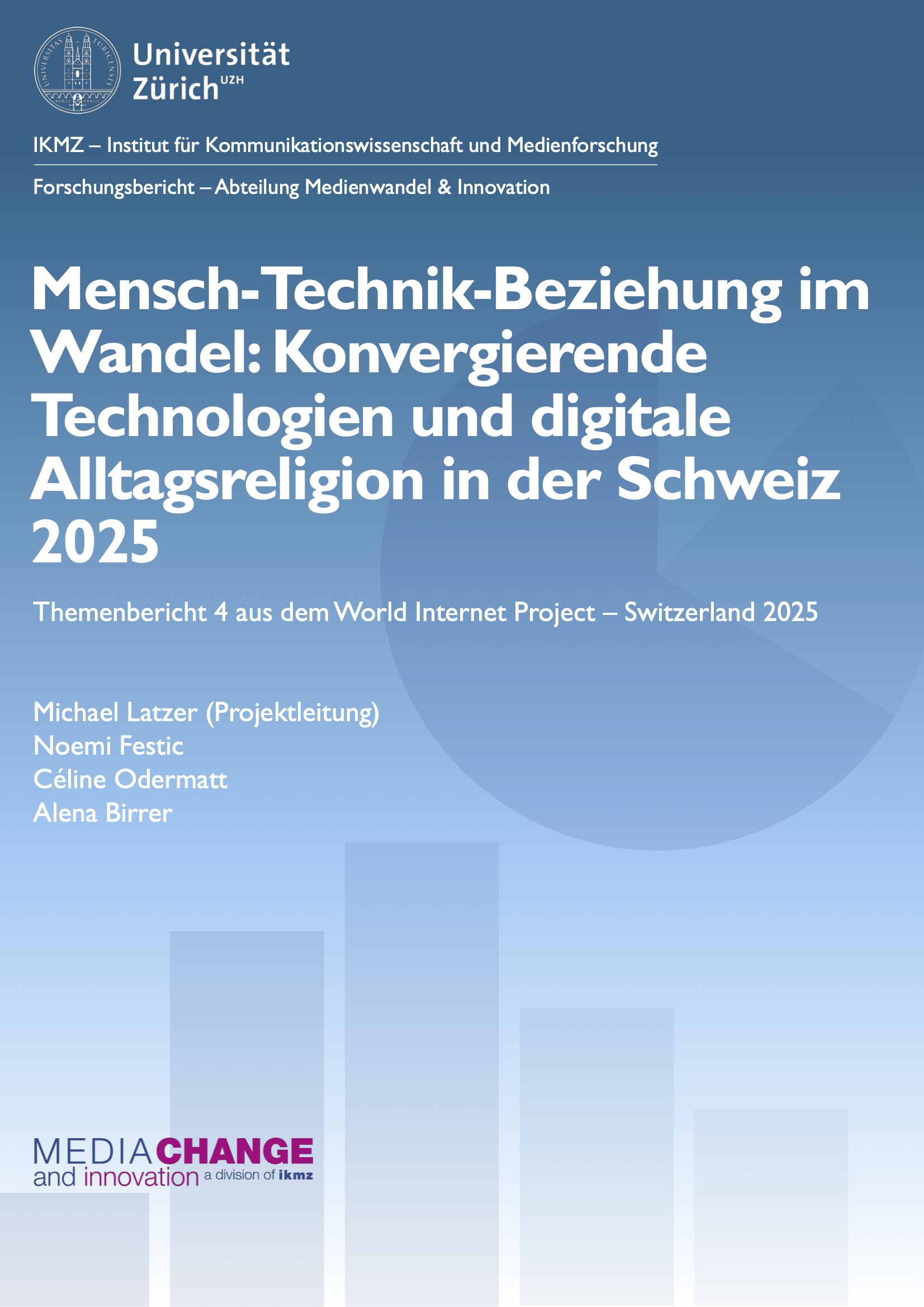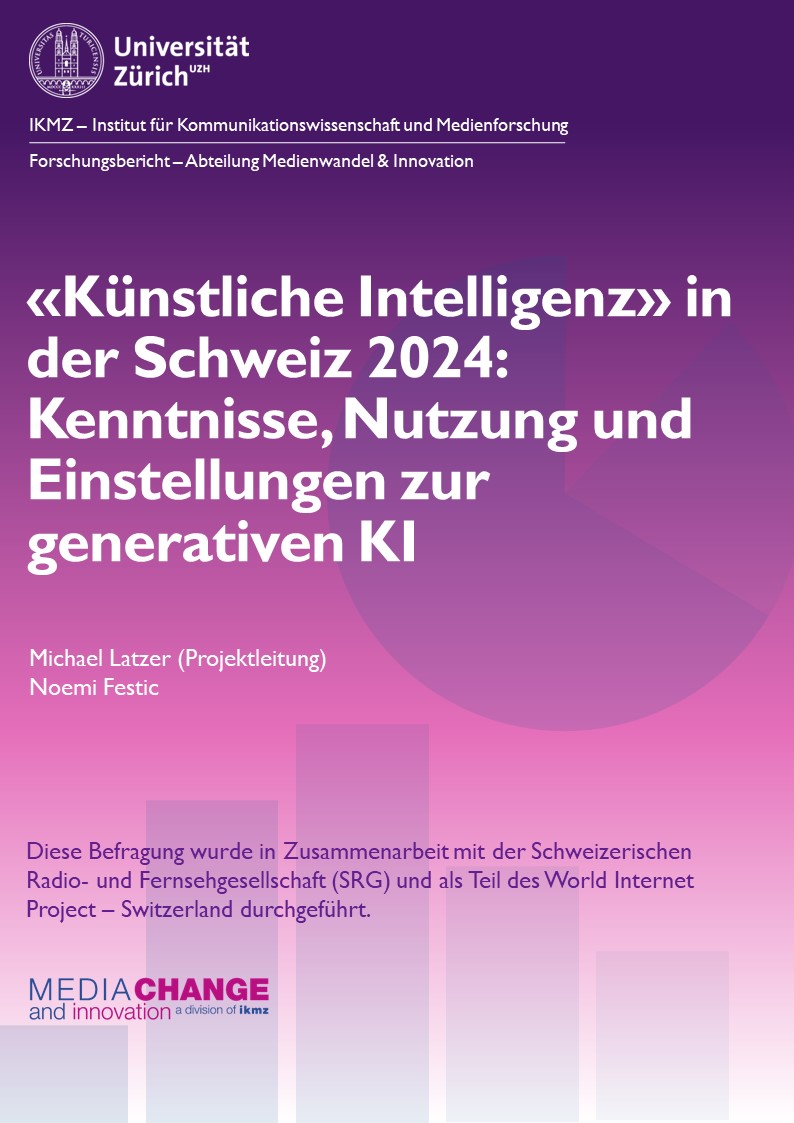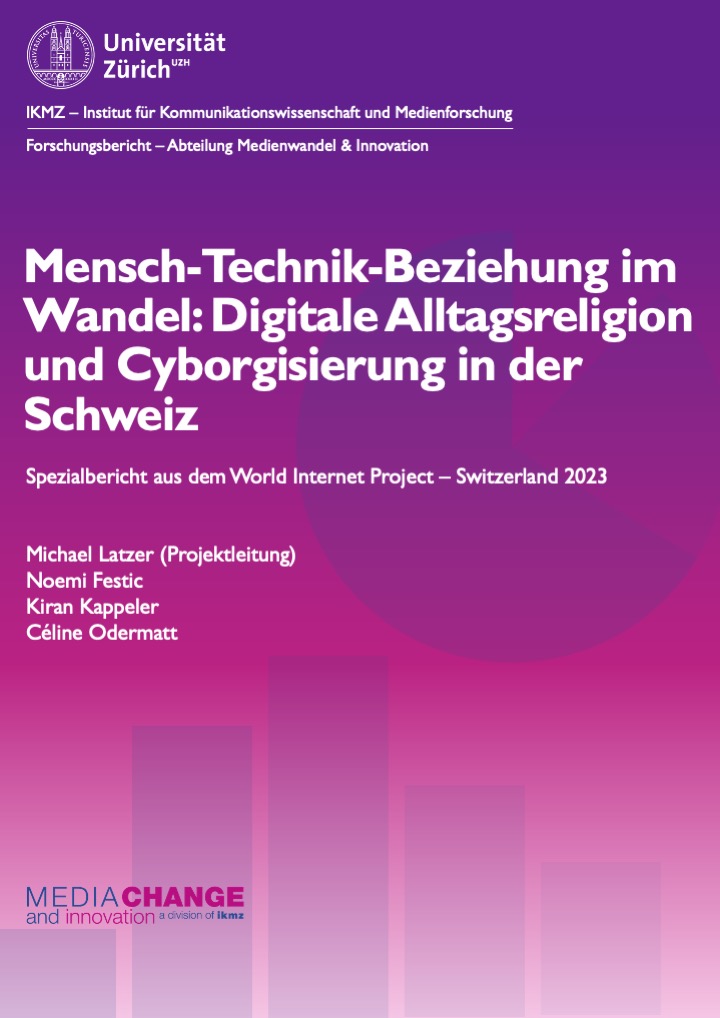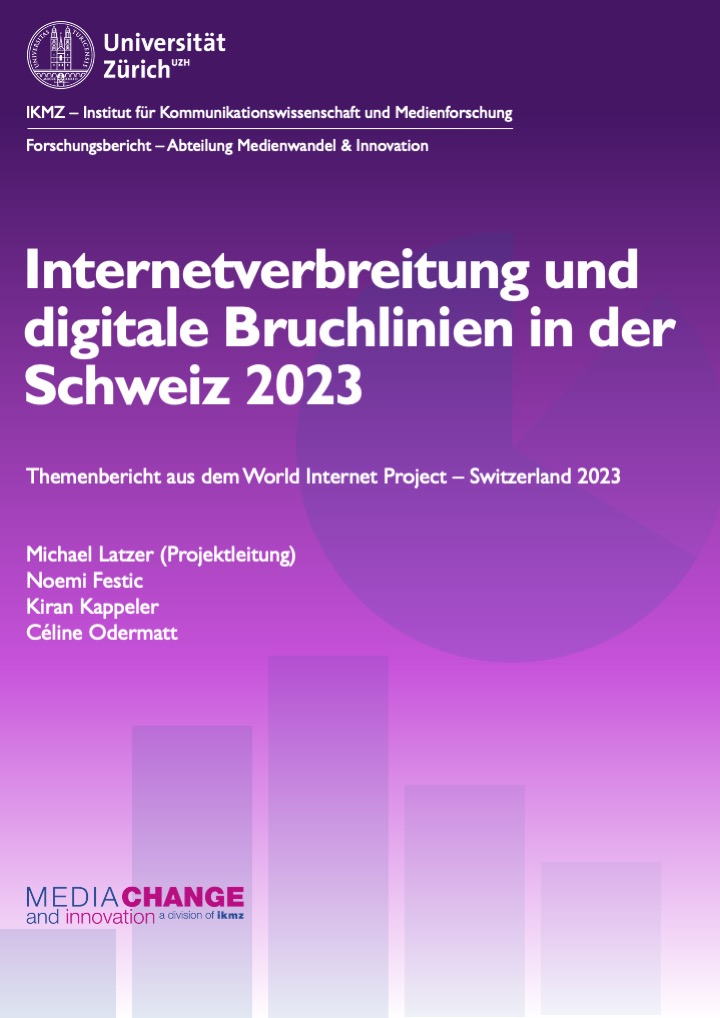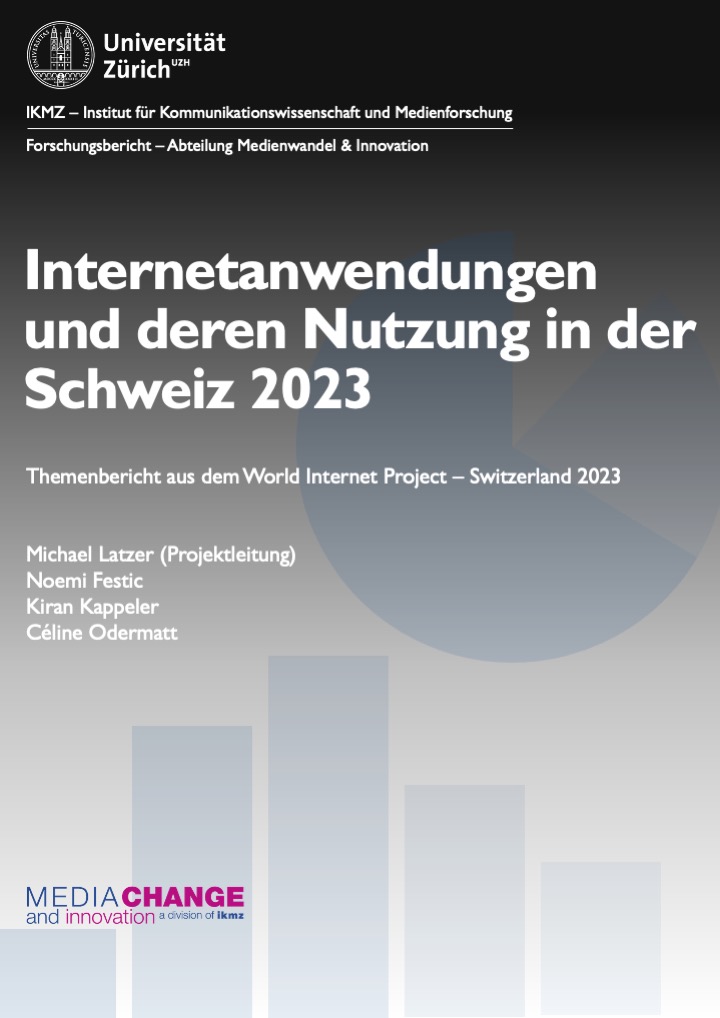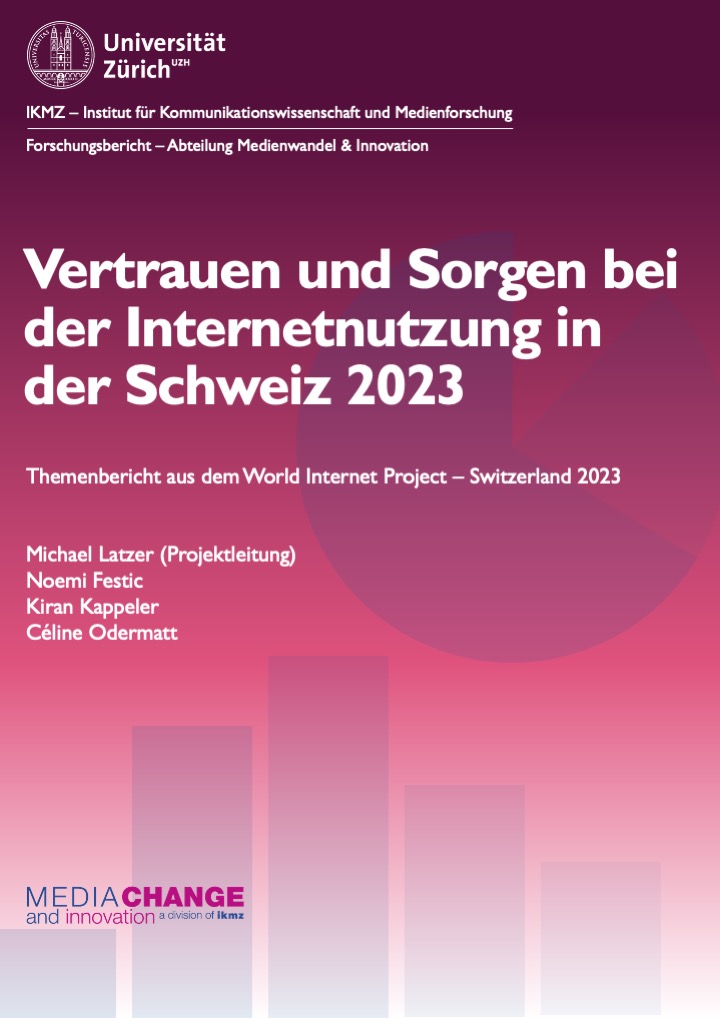News
-
New publications on techno-religion, human augmentation technologies, internet use in Switzerland
18th February 26The Media Change & Innovation Division team has recently published new peer-reviewed journal articles on techno-religion and human augmentation technologies, as well as the English versions of the four research reports from the World Internet Project – Switzerland 2025.
You can access the full publications here:
Latzer, M. (2026). Digitalization, AI and the rise of techno-religion: Transhumanist promises and the challenge to Enlightenment. Telecommunications Policy, 50(2), 103115. https://doi.org/10.1016/j.telpol.2025.103115 [pdf]
Frascaria, G., Jaramillo-Dent, D., & Latzer, M. (2026). Adoption of Human Augmentation Technologies for Non-Medical Applications: A Systematic Review of Empirical Literature. International Journal of Human–Computer Interaction, 1–33. https://doi.org/10.1080/10447318.2026.2625258 [pdf]
World Internet Project – Switzerland 2025 (English research reports):
- Internet Diffusion and Digital Divides in Switzerland 2025
- Use of the Internet and Generative AI in Switzerland 2025
- Trust and Concerns When Using the Internet in Switzerland 2025
- The Transforming Relationship Between Humans and Technology: Convergent Technologies and Digital Everyday Religion in Switzerland 2025
-
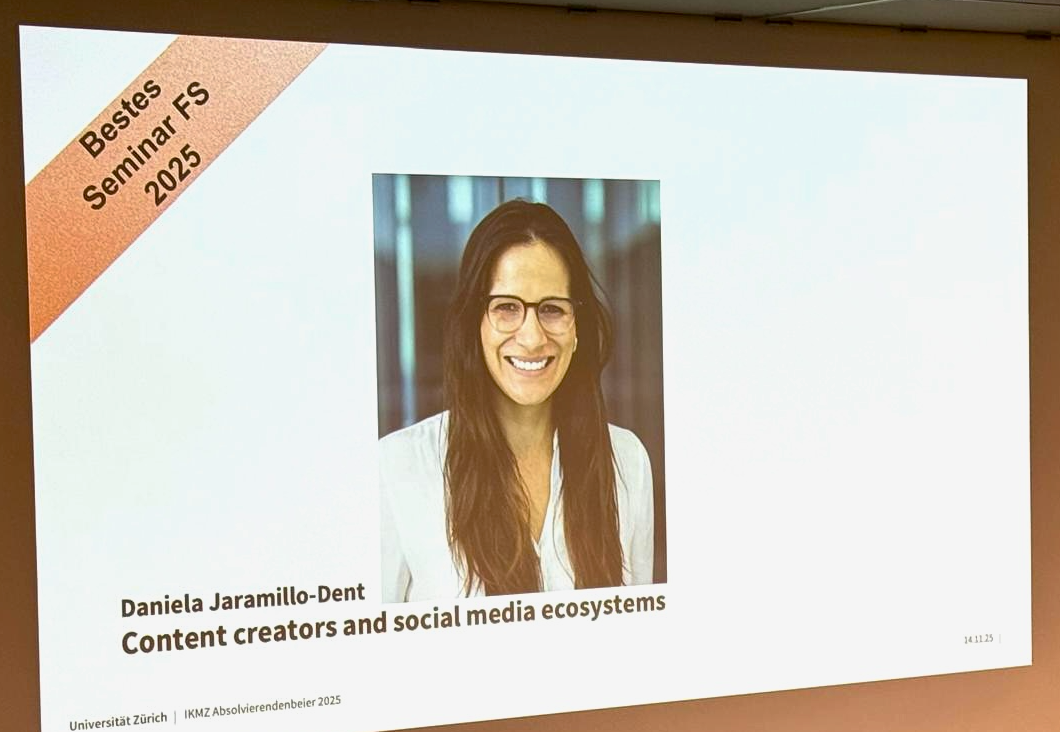
Our team member Daniela Jaramillo-Dent was honored last Friday with the Best Seminar Award by the Department of Communication and Media Research (IKMZ) at the University of Zurich.
Daniela received the award for her spring-semester seminar “Content creators and social media ecosystems,” in recognition of her outstanding and dedicated approach to teaching. The award was presented during the IKMZ’s annual graduation ceremony.
This is not the first time Daniela’s teaching excellence has been praised; she also received the Best Lecture Award in 2023 for her spring lecture course “Digital Inequalities and Platforms.”
We congratulate her on this well-deserved achievement!
-
Generative AI is Taking Over Everyday Life in Switzerland: From Experimentation to Regular Use
6th November 25Switzerland is more digital than ever and artificial intelligence is increasingly becoming part of everyday life. However, not everyone benefits equally: while younger people spend more time online than they would like, older people, those with low digital literacy and non-users of AI are falling behind. Most people in Switzerland are concerned about AI and the next generation of technology – but those who use AI regularly are more optimistic. These are the latest findings from the World Internet Project (WIP-CH) – Switzerland 2025, a representative long-term study by the University of Zurich. The WIP-CH has been examining internet use in Switzerland since 2011 and is now presenting the data for 2025.
Switzerland is online like never before: in 2025, people aged 20 to 29 spend an average of 8.4 hours per day online. The Swiss online population spends an average of 5.7 hours online each day – three times as much as in 2011 (1.8 hours) and two hours more than before the Covid pandemic in 2019 (3.6 hours). This generally increases the importance of digital life: “In 2025, for the first time, the internet is more important than personal contacts for 20- to 29-year-olds – both for information and for entertainment,” says study director Michael Latzer. Especially social media platforms such as TikTok and Instagram play a central role in the daily lives of young people (used by 95% of 20- to 29-year-olds), and their use is also increasing among older generations (58% among those aged 70+). The digitalization of everyday life is progressing rapidly: two out of three transactions (65%) are cashless, 39% of products are purchased online, and a third of work that can be done remotely is carried out from home (33%).
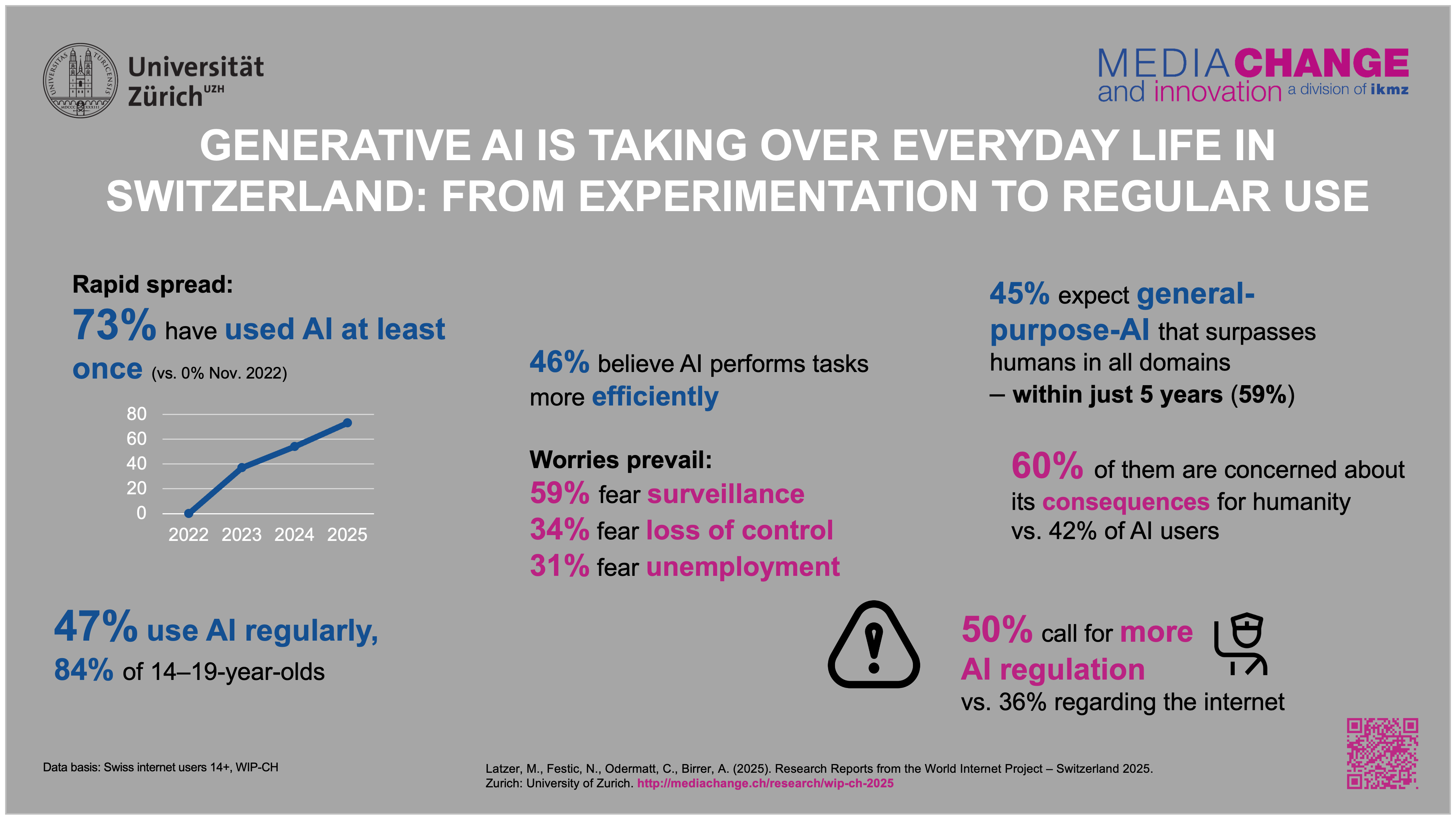
Almost half of Switzerland uses generative AI regularly: an unprecedented spread
Since the launch of ChatGPT in November 2022, the share of the population that has used generative AI has risen sharply. The share of the population that has already used such applications rose at record speed from 37% in 2023 to 54% in 2024 and 73% in 2025. What began as one-time experimentation has turned into regular use: nearly half of the population (47%) uses generative AI at least once a month (weekly: 21%, daily: 17%), and among 14- to 19-year-olds, the figure is as high as 84%. “Actual AI use is considerably higher, as AI is increasingly integrated into everyday services such as search engines and chatbots, often without being noticed”, explains Michael Latzer.
Generative AI is most commonly used in education and work (53%), with two-thirds of 20- to 29-year-olds doing so (64%). Three in ten (34%) 14- to 19-year-olds say they use AI to create content they were actually supposed to produce themselves. For many regular AI users, AI has also already become an important advisor for everyday decisions, for example regarding finances and career choices (21% each, compared to 3–4% among non-users). Among 14- to 19-year-olds, AI plays an important role in financial (29%) and health-related decisions (28%). However, compared to traditional sources, the overall importance of generative AI and influencers remains low: when it comes to political decisions, only 7% consider AI-generated information important, compared to 27% who rely on classic internet sources. Despite widespread use, skepticism remains: although a large majority of regular users are convinced that AI helps them complete tasks more efficiently (71%), only one-third (35%) believes that AI will improve life overall.
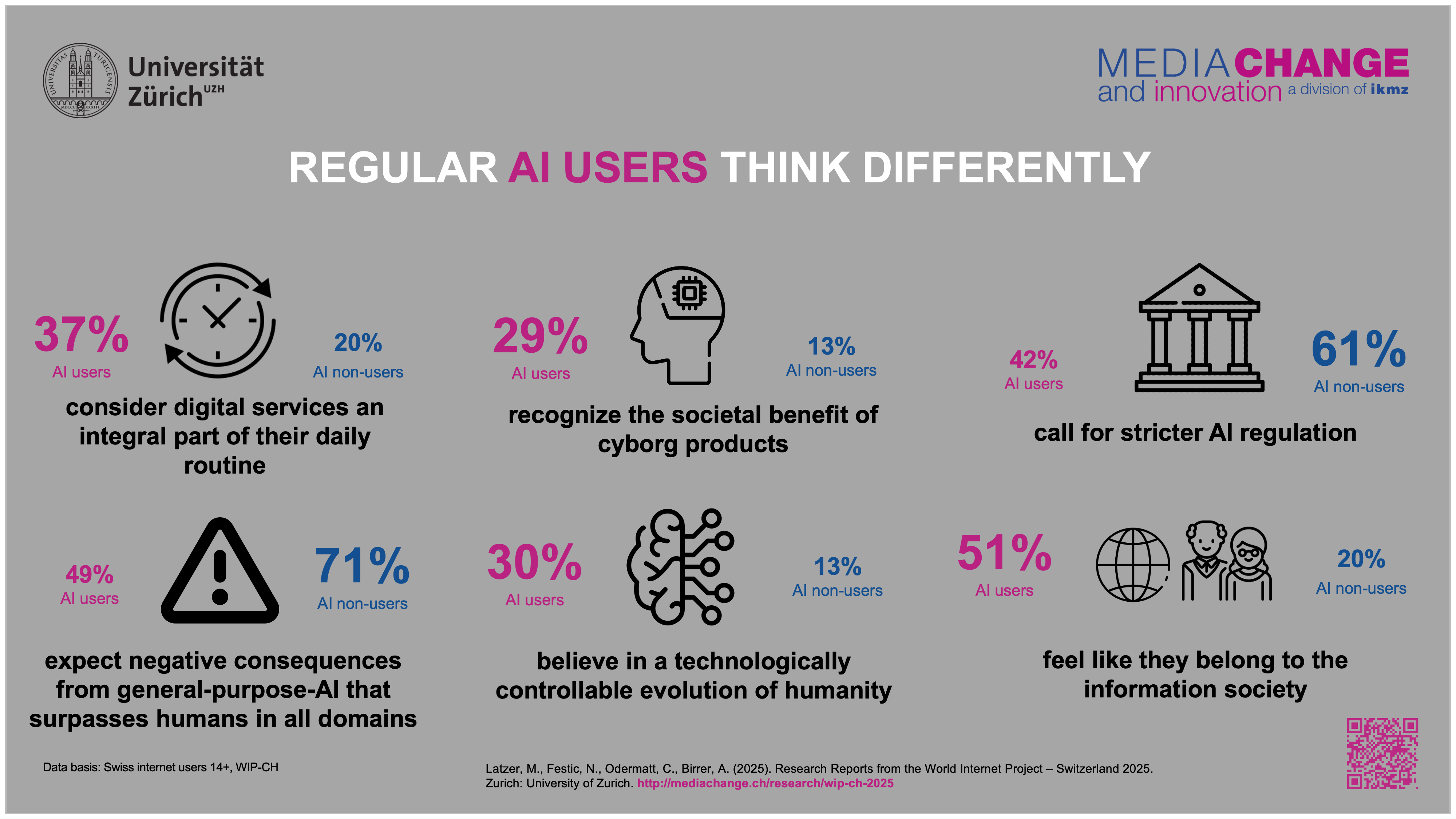
Surveillance, loss of control, and job fears – Switzerland calls for AI regulation
The Swiss population is concerned about the potential risks of AI: six in ten people in Switzerland (59%) fear increased surveillance, and one in three worries that generative AI could spiral out of control and spell the end of humanity (34%) or lead to mass unemployment (31%). Younger internet users tend to see the opportunities offered by generative AI, while older users tend to see the risks: for those under 30, the focus is on completing tasks more efficiently (58%), while for those aged 30 and above, the main concern is that generative AI could be used to monitor private life (58–66%). Accordingly, the demand for regulation is strong: one in two (50%) calls for stricter rules on generative AI – significantly more than for the internet in general (36%). Regular AI users are less likely to demand this (42%).
Half of Switzerland believes in “Artificial General Intelligence” and is worried about it
Almost half of Swiss internet users (45%) believe that generative AI will soon evolve into “Artificial General Intelligence” – a general-purpose application that surpasses humans in nearly all areas of life. More than half of them expect this to happen already within the next five years (59%). Those who use AI regularly are more likely to believe in the emergence of such “Artificial General Intelligence” (55%). However, this belief is accompanied by growing concerns about consequences: 60% of the population and 49% of AI users expect “Artificial General Intelligence” to have mostly negative effects on humanity. In contrast, attitudes toward the internet remain far more positive: 60% believe it is good for society.
Skepticism toward next generation of technology – risks of cyborg-products prevail
The next generation of technology combines internet-, bio-, and nanotechnologies with the aim of enhancing human abilities and overcoming biological limits – for example, through so-called cyborg products. While Silicon Valley has high hopes for such future technologies, the Swiss population remains skeptical: only one-fifth (21%) believes in this potential, rising to 30% among AI users. The majority, however, sees mainly risks, such as new forms of cybercrime (78%), privacy violations (67%), and social inequality (64%).
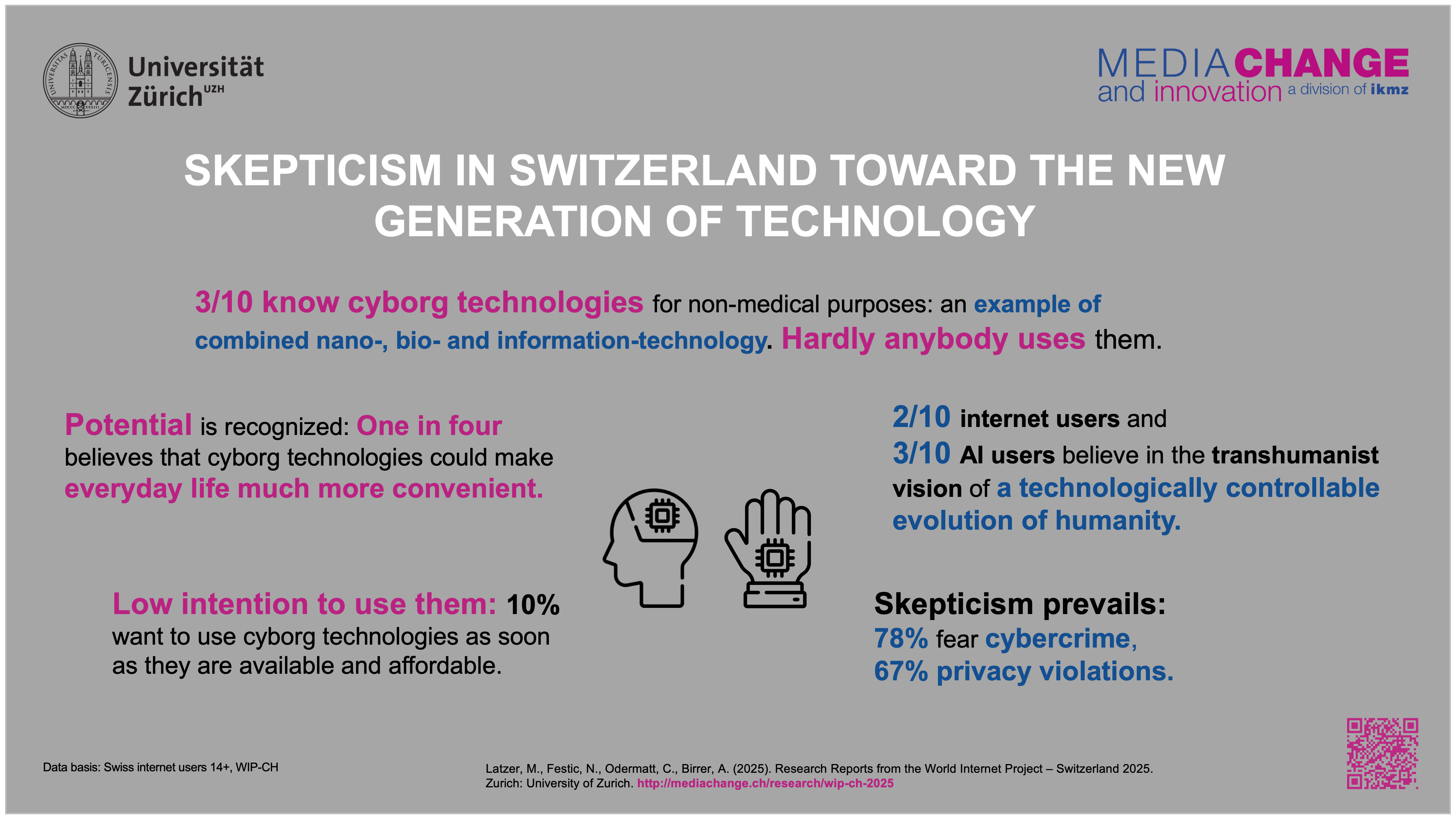
AI fuels digital divides: some lose time, others fall behind
Social divides in digitalization follow age and internet skills, reinforced by the use of AI. While 91% of 20- to 29-year-olds in Switzerland rate their internet skills as good to excellent, this applies to only 59% of those aged 70 and above. The difference is even more pronounced when it comes to generative AI: almost half of 14- to 19-year-olds (45%) feel comfortable using it, but only 20% of those aged 70 or older do. These differences are reflected in the sense of belonging to the information society. Only 34% of the population feel part of it, 25 percentage points less than in 2015. The sense of inclusion is particularly low among older people (19% among those 70+) and those with lower internet skills (14%), while 20- to 29-year-olds and people with high internet skills feel significantly more integrated (54% each). Those who use AI regularly feel more included (51% vs. 20% among non-users).
Digitalization also has its downsides: while older people and those who do not use AI risk being left behind, younger people and AI users struggle with digital overuse. More and more people now spend more time online than they would like (38% vs. 24% in 2019). Among 14- to 19-year-olds, 82% want to reduce their internet use time, as do 58% of AI users.
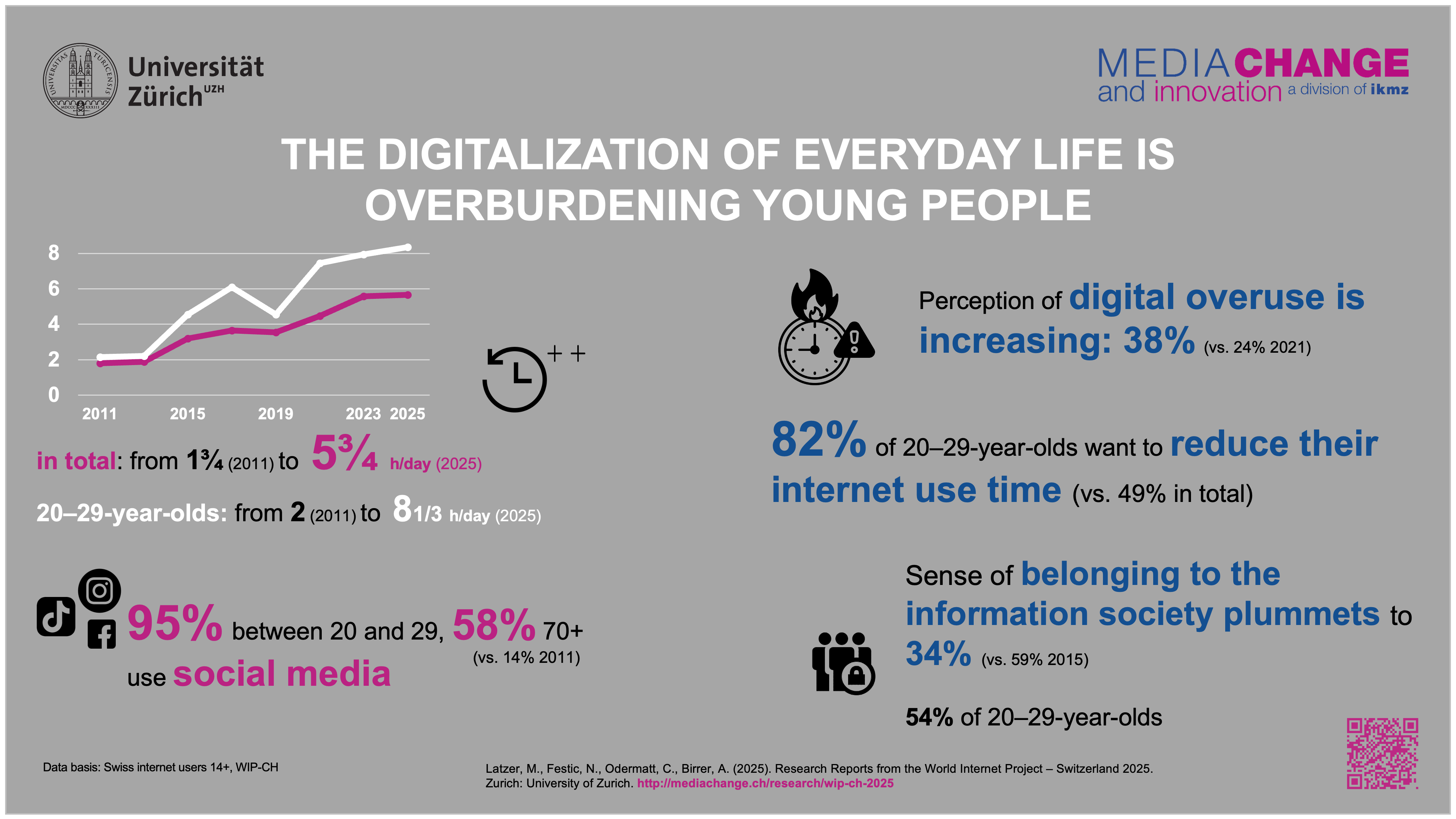
- News Release WIP-CH 2025 (in English)
- News Release WIP-CH 2025 (in German)
- News Release WIP-CH 2025 (in French)
- News Release WIP-CH 2025 (in Italian)
The full results can be accessed below in four research reports, 10 infographics, and 12 selected graphs.Research Reports 2025 in German (Themenberichte)
- Internetverbreitung und digitale Bruchlinien in der Schweiz 2025
- Nutzung von Internet und generativer KI in der Schweiz 2025
- Vertrauen und Sorgen bei der Internetnutzung in der Schweiz 2025
- Mensch-Technik-Beziehung im Wandel: Konvergierende Technologien und digitale Alltagsreligion in der Schweiz 2025
Research Reports in English
- Internet Diffusion and Digital Divides in Switzerland 2025
- Use of the Internet and Generative AI in Switzerland 2025
- Trust and Concerns When Using the Internet in Switzerland 2025
- The Transforming Relationship Between Humans and Technology: Convergent Technologies and Digital Everyday Religion in Switzerland in 2025
Infographics







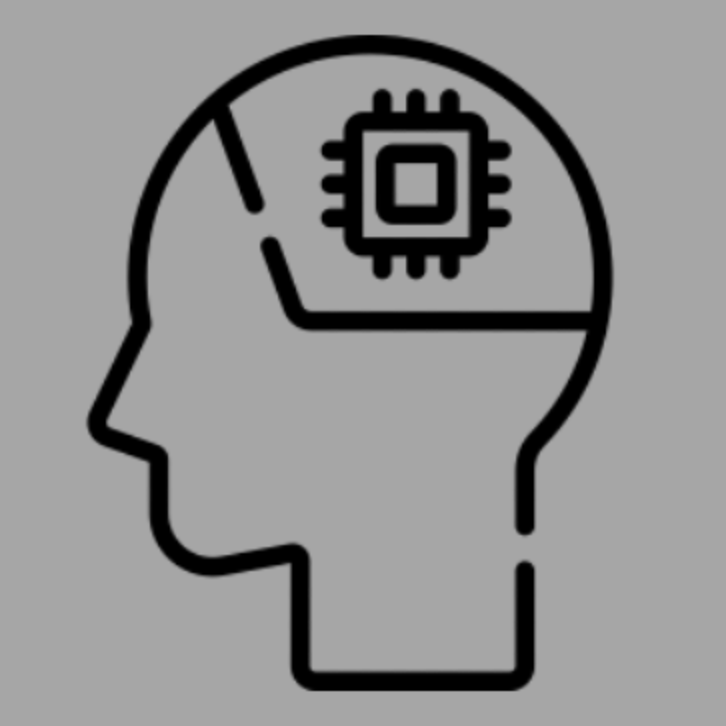


- The digitalization of everyday life is overburdening young people (English / German)
- Generative AI is taking over everyday life in Switzerland: from experimentation to regular use (English / German)
- Increasing use of digital services in everyday life in Switzerland (English / German)
- Digitalization level before, during and after the Covid pandemic (English / German)
- Digitalization push raises concerns in Switzerland (English / German)
- The young and the old differ regarding generative AI (English / German)
- Regular AI users think differently (English / German)
- Skepticism in Switzerland toward the new generation of technology (English / German)
- Increasing self-censorship in Switzerland due to perceived online surveillance (English / German)
- Internet use is becoming an everyday religion especially among young people in Switzerland (English / German)
Selected Graphs
- Knowledge and Use of Generative AI Over Time, 2022–2025 (English / German)
- Knowledge and Regular Use of Generative AI by Age, 2025 (English / German)
- Use Purposes of Generative AI, 2025 (English / German)
- Assessment of Risks and Opportunities of Generative AI, 2025 (English / German)
- Assessment of Selected Risks und Opportunities of Generative AI by Age, 2025 (English / German)
- Assessment of Risks and Opportunities of Generative AI by Use, 2025 (English / German)
- Belief in the Emergence of General Artificial Intelligence, 2025 (English / German)
- Average Daily Internet Use Time over Time 2011–2025 (English / German)
- Desire to Reduce Internet Use Time by Age, 2025 (English / German)
- Sense of Belonging to the Information Society by Internet Skills Over Time 2015–2025 (English / German)
- Perceived Benefits of the Internet and Converging Technologies Over Time 2023–2025 (English / German)
- Indicators of Transhumanist Belief, 2025 (English / German)
Icons made by Freepik, Ehtisham Abid, monkik and juicy_fish from www.flaticon.com
-
Vortragsreihe: Wie Digitalisierung und Künstliche Intelligenz unsere Gesellschaft verändern
8th September 25Wir freuen uns, die öffentliche Vortragsreihe „Wie Digitalisierung und Künstliche Intelligenz unsere Gesellschaft verändern“ anzukündigen und Sie herzlich dazu einzuladen. Diesen Herbst begrüssen wir jeden Dienstag um 14:15 Uhr Gastreferentinnen und -referenten.*
Die Vortragsreihe beleuchtet die enge Verbindung zwischen Medienwandel und gesellschaftlichem Wandel, mit besonderem Fokus auf die fortschreitende Digitalisierung der Gesellschaft und auf Künstliche Intelligenz (KI).
Jede Woche teilen internationale Expertinnen und Experten sowie Referierende der Abteilung Media Change & Innovation (IKMZ) Erkenntnisse aus ihrer Forschung und diskutieren aktuelle Fragen. Die Themen reichen von religionsähnlichen, transhumanistischen Verheissungen und Praktiken der Digitalisierung und KI, über Sinnkonstruktion bei Influencerinnen und Influencern, die Transformation des Menschseins durch Cyborgisierung, die abschreckenden Effekte von Dataveillance (Datenüberwachung), bis hin zu Auswirkungen auf Anthropozentrismus und das Anthropozän und noch vieles mehr.
Die öffentliche Vortragsreihe wird von der Abteilung Media Change & Innovation am Institut für Kommunikations- und Medienforschung (IKMZ) gemeinsam mit dem Center for Information Technology, Society, and Law (ITSL) organisiert und ist in die wöchentliche BA-Vorlesung von Prof. Dr. Michael Latzer integriert. Die Veranstaltung steht allen Interessierten offen.
Ort: Affolternstrasse 56, 8050, Zürich
Raum: AFL-F-121
Zeit: Jeden Dienstag um 14:15 - 15:45 Uhr
Vollständiges Programm
* Presentations will be held in German or English, according to the title.
-

We are proud to celebrate two special recognitions awarded at the 2025 Swiss Association of Communication and Media Research (SACM) Annual Conference last week in Chur.
Our team members Sarah Daoust-Braun and Noemi Festic received the Saxer Award for Best Presentation for their work on how motives for digital communication mitigate the chilling effects of dataveillance. This research is part of the Media Change & Innovation Division’s project The Chilling Effects of Dataveillance: Conceptual Advances and Empirical Evidence for Switzerland, funded by the Swiss National Science Foundation.
Our former team member Kiran Kappeler, now a postdoctoral researcher at the Center for Tracking and Society at the University of Copenhagen, was also honored with the Dissertation Award for her outstanding cumulative dissertation entitled “Negotiating Digital Technology Use in the Highly Digitized Swiss Society – A Mixed-Method Analysis of the Digital Practices of Individuals.”
Kiran’s doctoral work is based on her collaboration in three Media Change & Innovation Division’s projects: The Chilling Effects of Dataveillance: Conceptual Advances and Empirical Evidence for Switzerland and The Significance of Algorithmic Selection for Everyday Life: The Case of Switzerland, both funded by the Swiss National Science Foundation, as well as the World Internet Project - Switzerland.
We warmly congratulate them for their well-deserved achievements! -
“Artificial Intelligence” in Switzerland 2024: Rapid Diffusion and Increasing Digital Inequality
21st November 24This report examines how the current technological developments in “Artificial Intelligence,” specifically generative AI based on large language models (e.g., tools like ChatGPT), have been integrated into the daily lives of the Swiss and what they think about them.
Rapid diffusion: Within a year and a half of launch, AI tools are known across Switzerland, with half the population and nearly all of the young using them
Nearly all Swiss internet users (98%) have heard of AI tools, a figure that has increased since 2023 (79%). Half of Swiss internet users (54%) have already used AI tools. Among the youngest age group, nearly everyone (93%) has tried AI tools, with 43% using them frequently. In contrast, in the oldest age group, only 8% use them frequently, while almost three-quarters (72%) have never used them. The use of AI tools has risen by 17 percentage points since mid-2023 (2024: 54%, 2023: 37%).
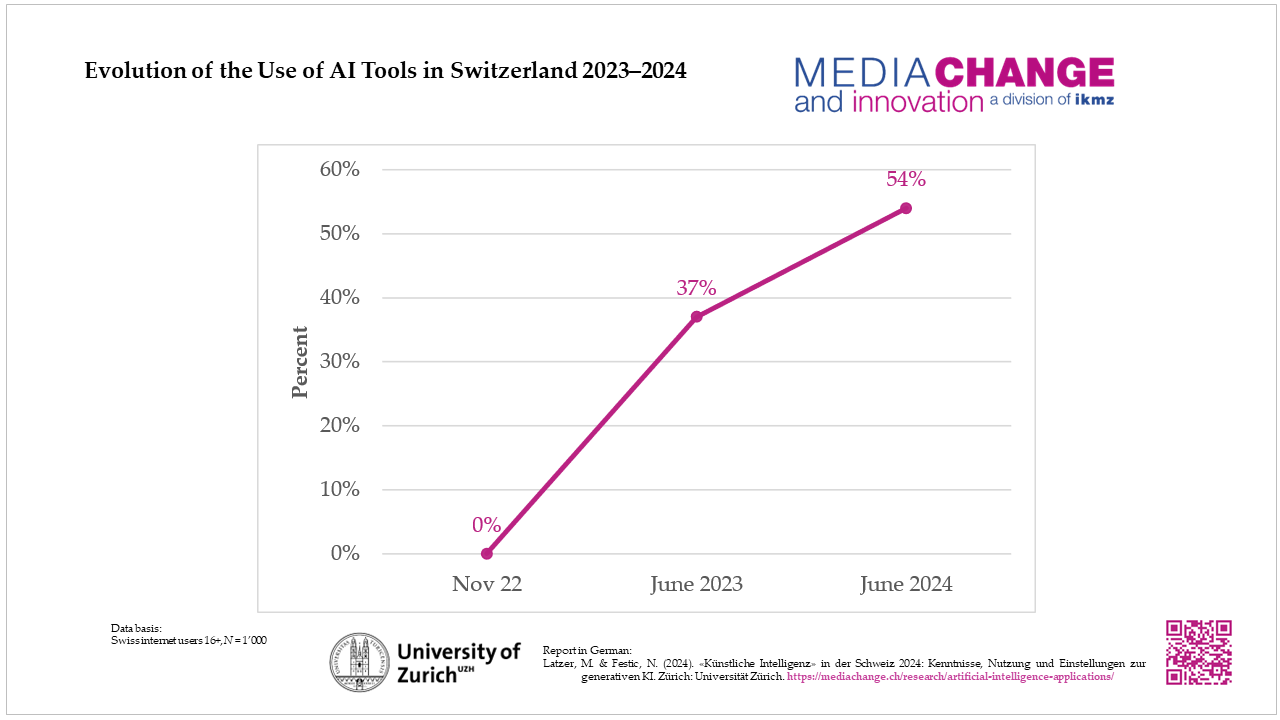
Digital inequalities in the Swiss society by age and education are amplified by Artificial Intelligence
Knowledge of AI tools is significantly higher among younger age groups (61% among the youngest vs. 7% among the oldest). Younger individuals are also much more likely to be AI users (ages 16–29: 93%, ages 70+: 24%). Additionally, the proportion of users rises sharply with increasing levels of educational attainment (low: 37%, medium: 42%, high: 70%).
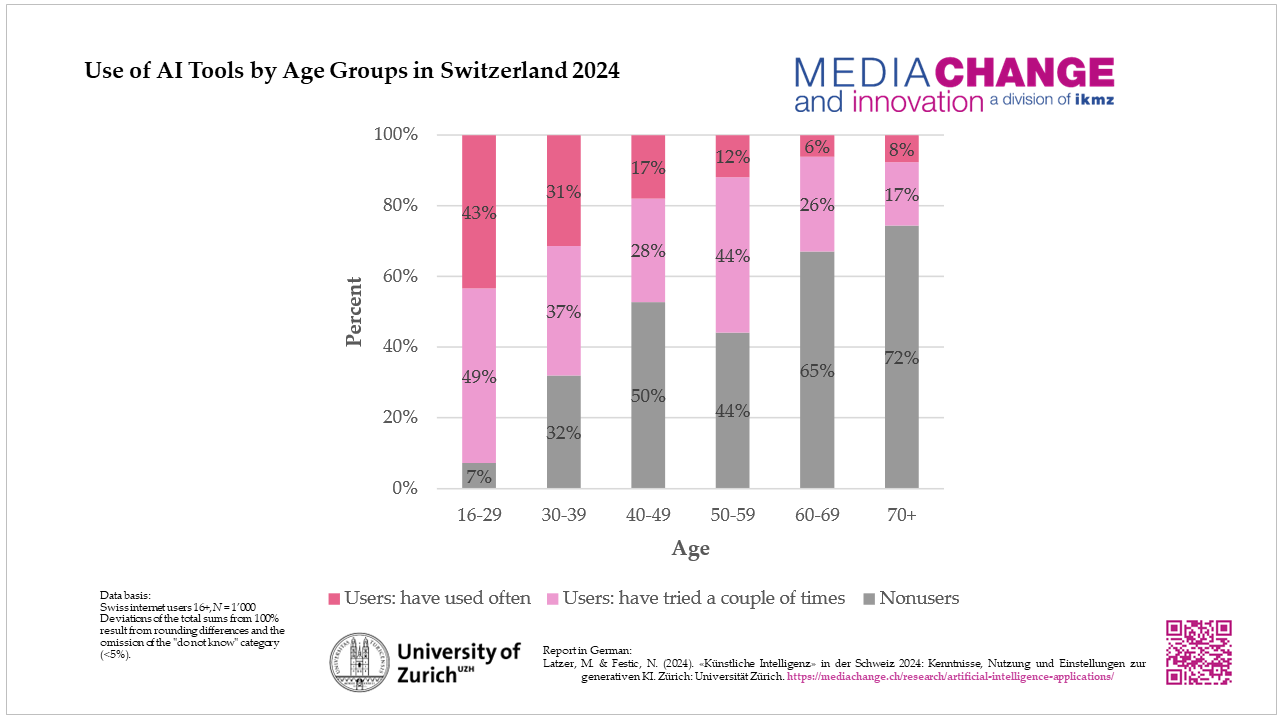
Early signs of saturation; Incorrect information from AI tools is the main reason for non-use
There appears to be a certain level of saturation in the adoption of AI tools: 77% of current non-users consider it (very) unlikely that they will use AI tools in the next six months. The most common reason for non-use is that "generative AI often produces incorrect information" (mean = 4.01). An almost equally important reason is that AI tools have little relevance to the daily lives of respondents (mean = 3.93).
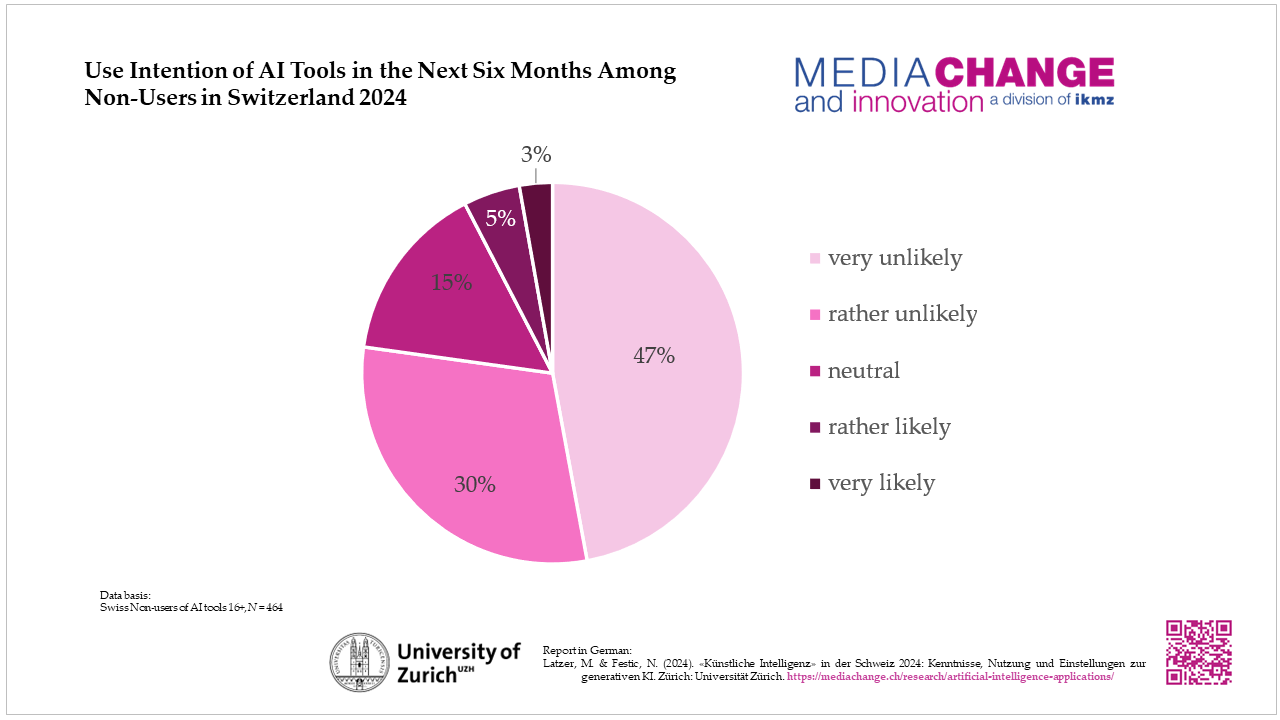
Half of Swiss internet users are skeptical about children using AI tools; AI users, younger people, and men view it more positively
Half (54%) of Swiss internet users aged 16 and older believe that children should not have access to AI tools. A third (33%) support access, and 13% are undecided. Younger individuals, men, and AI users are more likely to support children using AI tools.
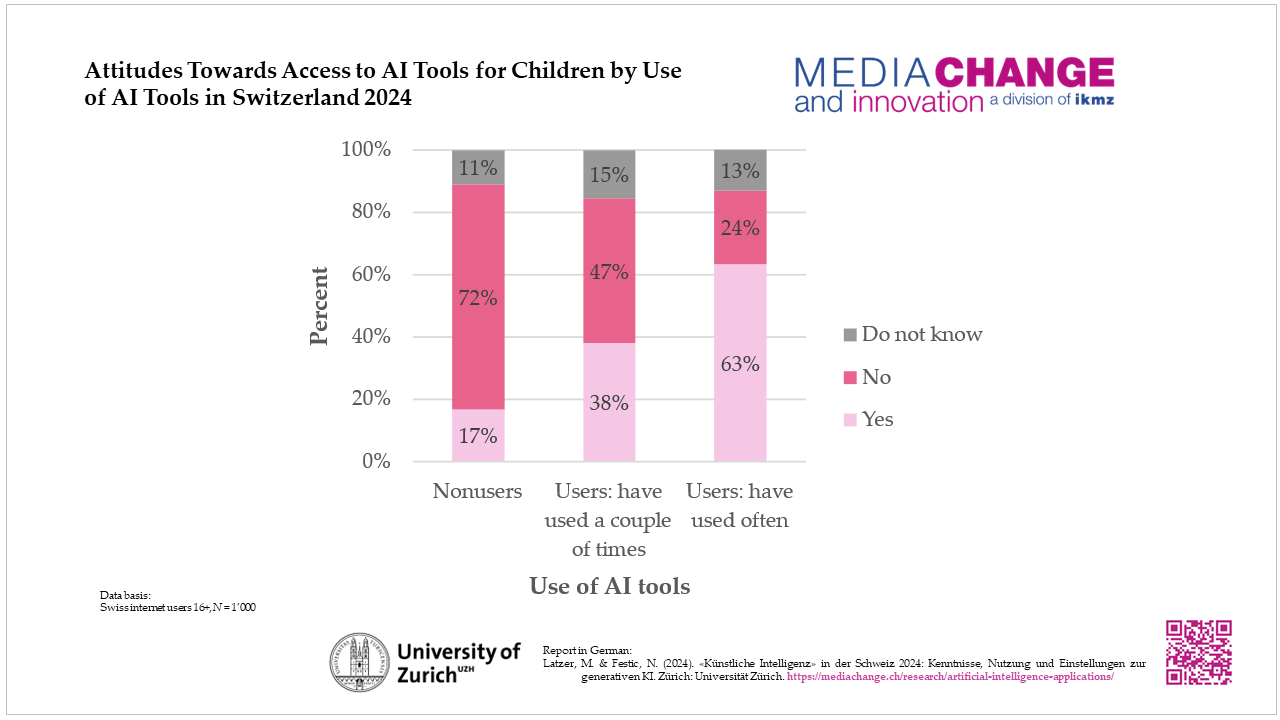
As part of the World Internet Project – Switzerland, we collaborated with the Swiss public broadcasting association (SRG) to collect nationally representative data on the use and implications of these AI tools. As part of their repeated “Wie geht’s, Schweiz?” survey that is concerned with the well-being of the Swiss population in various areas of life (politics, personal finances, work, relationships, etc.), the data was collected in May and June 2024.
The results are available in the report and the news release in German and English. The English version of the report will be published soon.
- «Künstliche Intelligenz» in der Schweiz 2024: Kenntnisse, Nutzung und Einstellungen zur generativen KI
- News Release “Artificial Intelligence” in Switzerland 2024 (in German)
- News Release “Artificial Intelligence” in Switzerland 2024 (in English)
Infographics
- Evolution of the Use of AI Tools in Switzerland 2023-2024 (English/German)
- Use of Al Tools by Age Groups in Switzerland 2024 (English/German)
- Use Intention of Al Tools in the Next Six Months Among Non-Users in Switzerland 2024 (English/German)
- Attitudes Towards Access to AI Tools for Children by Use of Al Tools in Switzerland 2024 (English/German)
-

Our team member Kiran Kappeler successfully defended her cumulative dissertation on July 10th. We warmly congratulate her on this significant accomplishment.
Her outstanding dissertation includes four peer-reviewed articles and is entitled “Negotiating Digital Technology Use in the Highly Digitized Swiss Society—A Mixed-Method Analysis of the Digital Practices of Individuals.”
Kiran has been working in the Media Change & Innovation Division as a Research and Teaching Associate since September 2019. She will continue her work as a Senior Research and Teaching Associate over the following months. We wish her great success in her next career steps.
-
Internet Use as Everyday Religion on the Rise, Cyborgization Still in its Early Stages
16th November 23
The next generation of digital technology is spreading in Switzerland: Artificial intelligence has already arrived, cyborg technologies for self-optimization have not yet. Especially among younger people, internet use is becoming an everyday digital religion. These are results of the World Internet Project – Switzerland 2023.Chatbots with artificial intelligence (AI) such as ChatGPT or Bard are already widespread in Switzerland: 8 in 10 internet users (79%) have already heard of them and half of those (37%) have already either tried (18%) or used them multiple times (19%). Younger and more highly educated people know of and use these services particularly often. “The high level of awareness and use of ChatGPT and similar AI applications is surprising, especially since they have only been available since the end of 2022,” emphasizes Michael Latzer, professor of Media Change and Innovation at the University of Zurich.
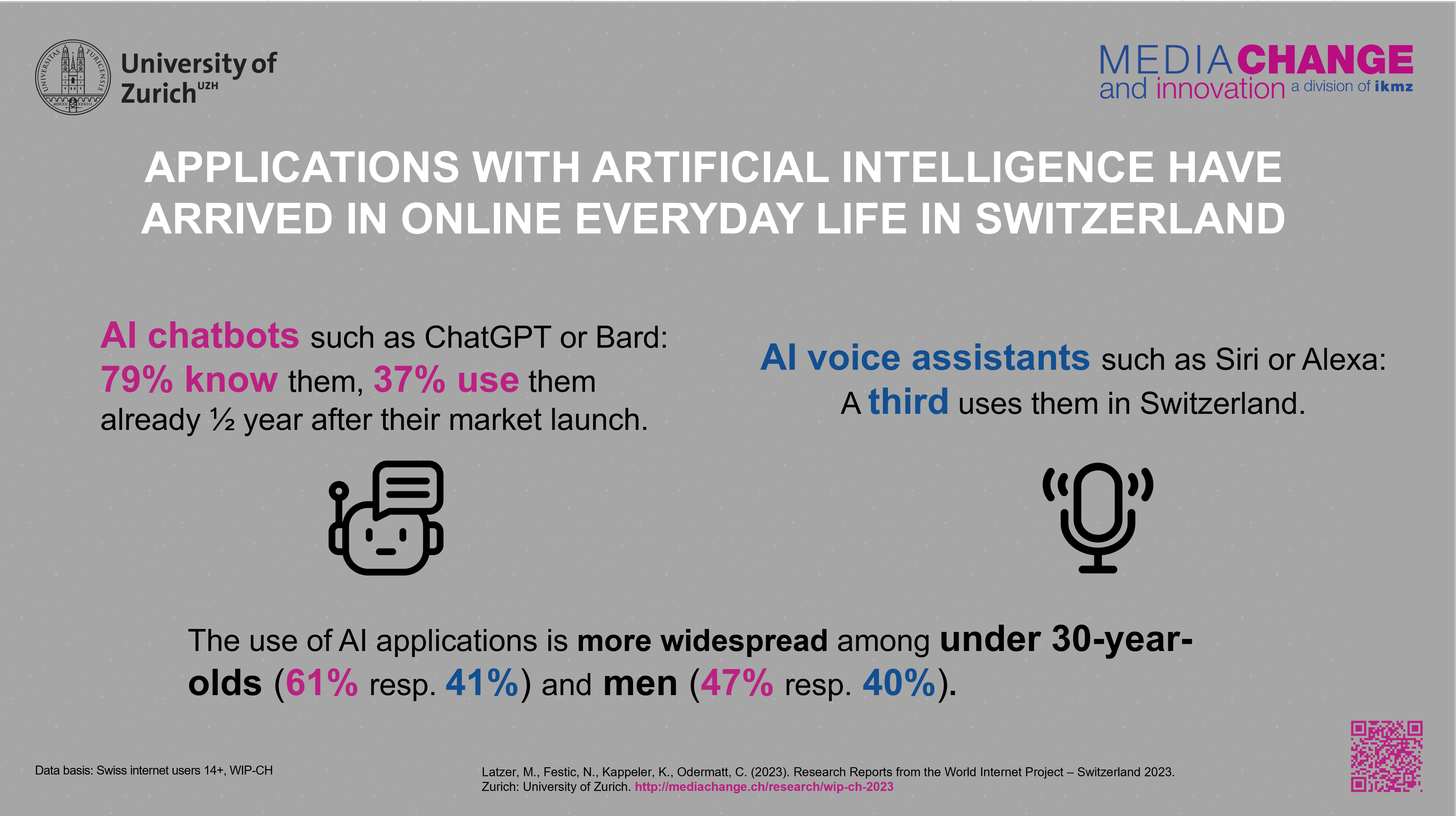
Clear indications of a religion-like digitalization
Digitalization is giving rise to a new social form of religion – an everyday digital religion. The everyday use of digital services fulfills similar social functions as traditional religions, e.g., reducing complexity, creating meaning or social cohesion. Just under a third of the population (30%) think that suggested content in social networks or health and well-being apps is controlled by an inexplicable, higher instance. For a quarter of the population (27%), internet use has become a kind of ritual: they start and end their day with it. Between 10% and 19% of internet users report transcendental experiences that exceed the usual boundaries of everyday life.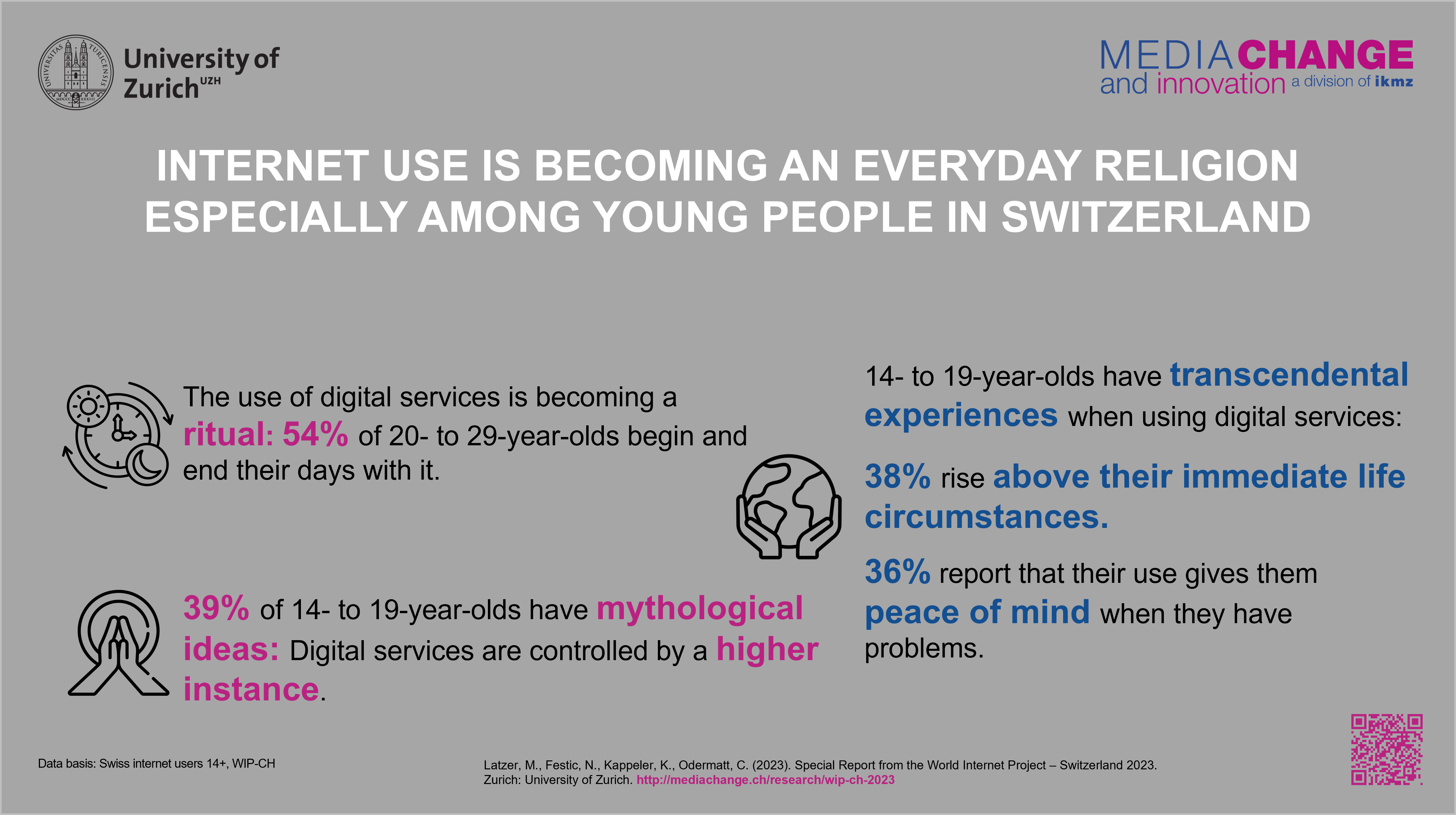
Cyborgization is still in its infancy
The merging of humans and technology known as cyborgization reinforces the religious nature of digitalization. Cyborg technologies are used to achieve transhumanist goals, i.e., overcoming human limitations and thus also reaching divine characteristics such as omniscience and eternal life. The study examines non-medically required cyborg technologies for self-optimization such as stick-on patches for electronic brain stimulation or chips implanted in the hand for making payments. They are used to improve physical and mental abilities, exceed biological limits and thereby increase longevity and well-being.A good third of the Swiss online population is familiar with cyborg technologies attached to the body (37%) or implanted in the body (35%). Their distribution is currently low and lies in the low single-digit percentage range. However, 4 out of 10 internet users believe that they could make their everyday life much more convenient by using them (39%). At the same time, there is a high level of risk awareness, particularly with regard to cybercrime (78%) and privacy breaches (70%).
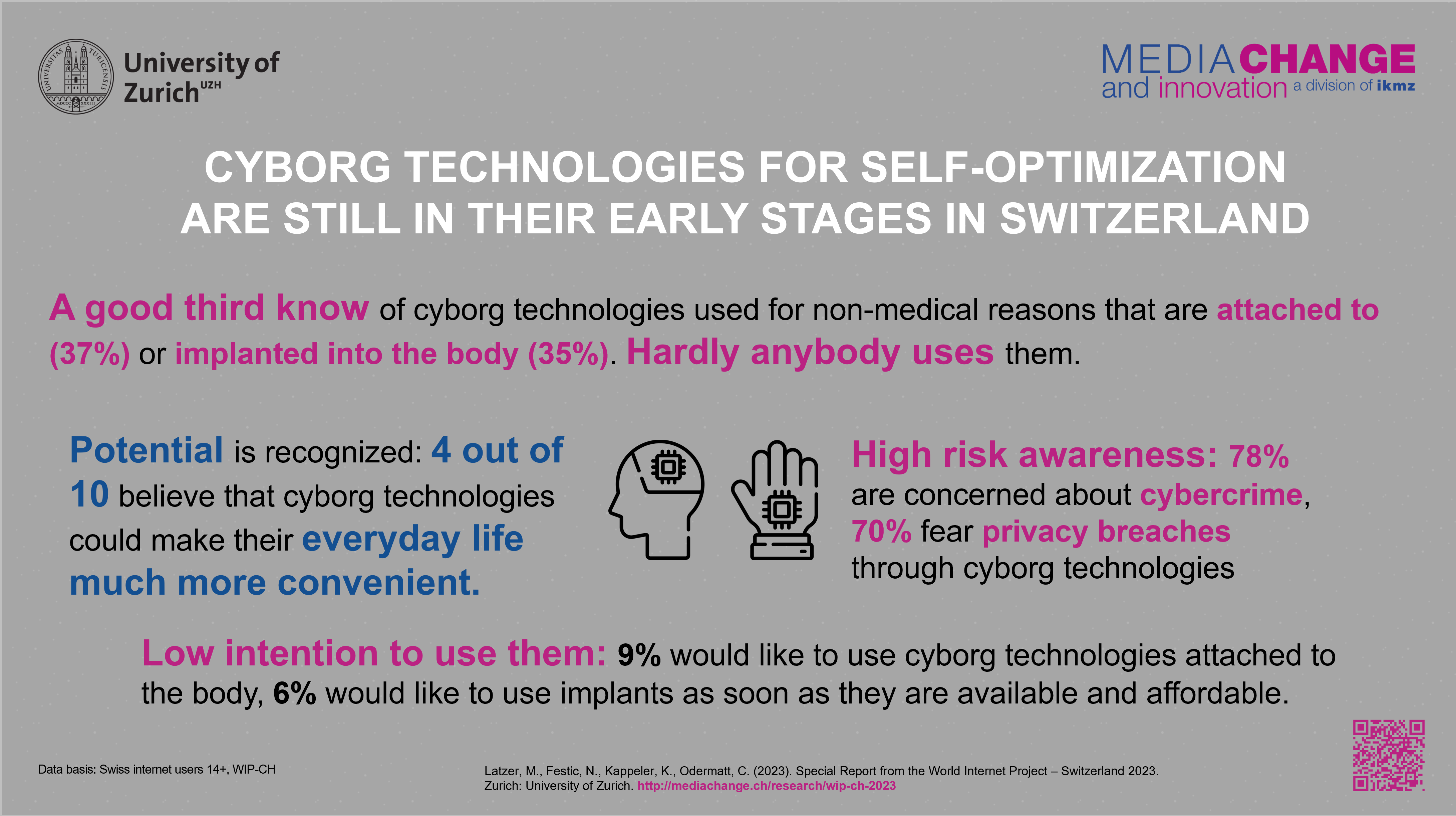
- News Release WIP-CH 2023 (in English)
- News Release WIP-CH 2023 (in German)
- News Release WIP-CH 2023 (in French)
- News Release WIP-CH 2023 (in Italian)
The full results can be accessed below in four research reports (in German) and 6 infographics.Special Report 2023: Everyday digital religion and cyborgization
Research Reports 2023 (Themenberichte)
- Internetverbreitung und digitale Bruchlinien in der Schweiz
- Internetanwendungen und deren Nutzung in der Schweiz
- Vertrauen und Sorgen bei der Internetnutzung in der Schweiz
Infographics





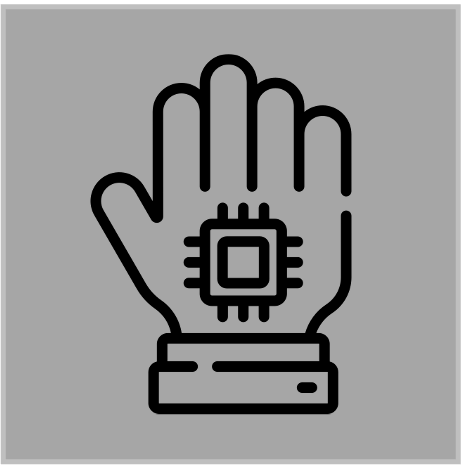
- Internet use is becoming an everyday religion especially among young people in Switzerland (English / German)
- Applications with artificial intelligence have arrived in online everyday life in Switzerland (English / German)
- Pandemic-related digitalization pushes make lasting change on everyday life in Switzerland (English / German)
- Switzerland is optimistic about the internet (English / German)
- Increasing chilling effects due to perceived online surveillance in Switzerland (English / German)
- Cyborg technologies for self-optimization are still in their early stages in Switzerland (English / German)
Icons made by Freepik, Ehtisham Abid, monkik and juicy_fish from www.flaticon.com
-
Michael Reiss successfully defended his cumulative dissertation
7th November 23
Our former team member, Michael Reiss, successfully completed his doctoral studies at the end of October. He defended his cumulative dissertation entitled “News must die for news to live. Empirical, methodological, conceptual, and theoretical perspectives on contemporary news consumption and a proposal for a normative turn.”
Michael worked for the Media Change & Innovation Division for five years. He recently joined the Leibniz Institute for Media Research | Hans-Bredow-Institut in Hamburg as a postdoc.
We congratulate him on this important achievement and wish him every success in this new stage in his career.
-
Daniela Jaramillo-Dent elected to ICA Board of Directors
18th October 23
Our team member Daniela Jaramillo-Dent will join the Board of Directors of one of the most important associations in communication and media research. She was elected Board Student and Early Career Representative of the International Communication Association (ICA) in October 2023.
Daniela will begin her two-year term in June 2024 on the closing day of the annual ICA conference, which will take place in Australia. She will support student and early career members through various initiatives and represent them at the Board of Directors meetings. She currently serves as the Student and Early Career Representative for the ICA Intercultural Communication Division.
The Media Change & Innovation Division warmly congratulates Daniela for her election. We wish you good luck in your new role!

